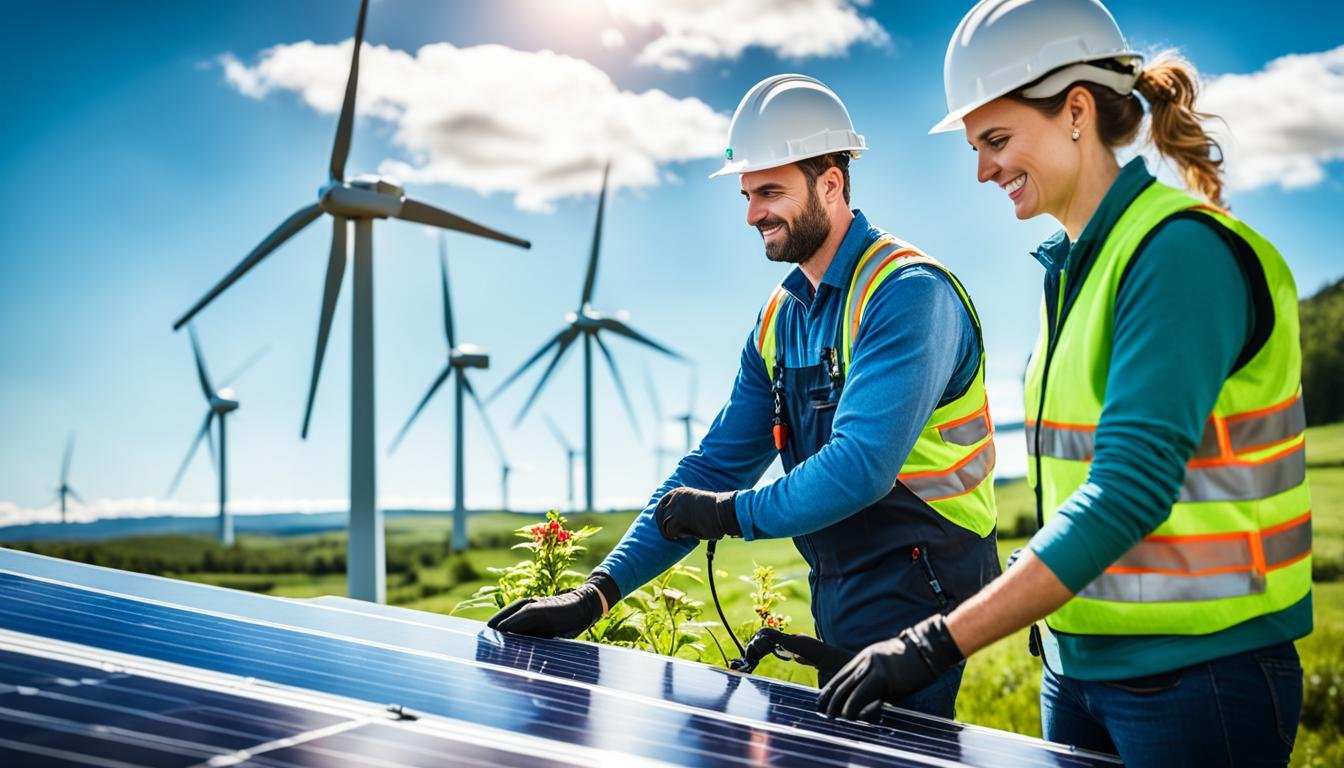Climate Tech: Innovations and startups focused on mitigating climate change.
Is the climate crisis making groundbreaking climate tech soar and change our future?
The IPCC’s AR6 Synthesis Report: Climate Change 2023 warns of a serious climate emergency. This urgent situation has led to new climate tech, green innovations, and green energy startups. These ventures aim to solve the issue. Jackery, Northvolt, and Aurora Solar are leading the way with their green and scalable solutions. For example, Jackery’s growth has jumped a massive 1,060% in only five years. This shows how much people are interested in green energy now.
Many startups are joining the fight from many different areas. They are not only bringing new tech but also a promise of a green future for our children. They are working towards a world that emits zero carbon, leading the climate tech field. By 2033, the market for climate tech is expected to hit $182.5 billion. This highlights their crucial role in saving the planet.
Key Takeaways
- Jackery’s tremendous 1,060% growth underscores the soaring demand in renewable energy startups.
- The climate tech market is anticipated to reach $182.5 billion by 2033, reflecting the industry’s vital role.
- Northvolt’s 467% search growth indicates substantial interest in sustainable lithium-ion battery solutions.
- Startups like Aurora Solar are innovating within the solar energy sector with a growth of 64% in five years.
- The IPCC’s AR6 Synthesis Report underscores the urgency of adopting effective climate change mitigation strategies.
- The burgeoning climate tech industry offers promising eco-friendly innovations to tackle the climate crisis.
Introduction to Climate Tech and its Importance
Climate tech covers many new technologies to fight climate change. It’s not just about the environment. There are also economic chances that help growth and sustainability. Energy from the sun, wind, and water helps cut down on harmful gases. This makes for a cleaner and greener future. It also brings new jobs in clean energy.
Money going into green tech is boosting progress in many fields. Let’s look at some areas that are making big steps:
- Energy Efficiency: Technologies like smart thermostats, LED lights, and better HVAC systems help use less energy.
- Climate Data and Analysis: Tools such as remote sensing and machine learning help us understand and react to climate changes.
- Clean Transportation: Cars that run on electricity or hydrogen offer cleaner travel options.
- Sustainable Agriculture: New farming methods help crops grow more while cutting down on damage to our planet.
- Energy Storage: Better batteries and pumped-up water storage give more reliable power from clean sources.
- Carbon Capture: Machines that take CO2 and store it safely help cut pollution from factories and more.
The money world is also changing for climate tech. Even with a dip in 2023, big money is still going into this field. In 2023, Europe led in climate tech investments with $10 billion in just one quarter. This shows how crucial this tech is for fighting climate change.
Government actions like the Inflation Reduction Act are putting over $390 billion into green efforts. This big investment proves the importance of these solutions to our future. It’s about transforming society with new, green energy options.
Climate tech has grown a lot in the last decade, with its worth jumping 45 times. This shows its strength, even through tough times. In 2023, the value of green tech startups came back strong after a fall the year before. This bounce back highlights the bright future of clean and sustainable technology.
Achieving Net-Zero Carbon Emissions
To limit global warming to a 1.5°-degree rise, the world must go to net-zero carbon emissions. This change will need many trillions of dollars over numerous years. Climate tech is crucial for this goal. Leaders in industry must take big steps quickly to make this happen.
Circulor’s Transparent Supply Chains
Using blockchain, Circulor is leading the way in making supply chains transparent for the sake of cutting carbon. It helps companies know their carbon impact better, making it easier to reduce. Clear supply chains are key to hitting net-zero emissions and lessening environmental harm.
Heirloom’s Enhanced Carbon Mineralization
Heirloom is changing how we capture and store carbon by making use of mineralization better. They speed up how nature takes CO2 and turns it into stable minerals. This lowers atmospheric carbon a lot. This new method is vital for fighting climate change and reaching sustainable goals.
Sylvera’s Carbon Offset Validation
Sylvera ensures the carbon offset market is accurate and trustworthy with clear, standardized checks. This way, companies can be sure their money is really making a difference in reducing emissions. Good, trusty carbon offset methods are key in moving towards zero carbon emissions.
| Company | Focus | Impact |
|---|---|---|
| Circulor | Blockchain Supply Chains | Enhanced transparency, Reduced emissions |
| Heirloom | Carbon Mineralization | Accelerated CO2 absorption, Long-term storage |
| Sylvera | Carbon Offset Validation | Standardized offsets, Reliable emissions reduction |
Innovations in Sustainable Technologies
We’re moving towards a greener future with new sustainable technologies. These advancements are changing how we do things in big ways. Using renewable resources and new business models, we’re pushing ahead.
Checkerspot’s High-Performance Materials
Checkerspot is leading the way in making top-notch materials. They are expert in working at the tiniest levels to create new solutions. These materials are both great at what they do and help the planet.
By following a sustainable path, Checkerspot shows how to be both innovative and green.
Greyparrot’s AI Waste Management
Greyparrot is changing how we recycle. They use smart AI to better sort waste, making recycling more effective. Their high-tech system helps the earth by reducing waste and boosting recycling rates.
Oceanworks’ Recycled Ocean Plastics
Oceanworks fights plastic pollution by using ocean plastics in new products. Their approach supports the environment and lessens the need for new plastics. This reduces harm to our oceans and helps keep the planet cleaner.
They are helping develop a cycle where nothing goes to waste. This is good for the earth and for us.
To further illustrate the impact of these innovations, consider the following table that highlights key statistics and investment trends in climate tech startups:
| Statistic | 2022 | 2023 |
|---|---|---|
| VC Investments in Climate Tech Startups | Up in H1 2022 | Higher in H1 2023 |
| Forecasted Contribution of Solar and Wind Energy to Global Electricity | 12% | 33% by 2030 |
| Microsoft’s Climate Innovation Fund | – | $1 billion committed |
| Fund Size of ENGIE New Ventures | – | €250 million |
Sustainable Business Models in Climate Tech
Businesses are moving towards sustainable ways, boosting growth and new ideas in climate tech. A large sum of $260 billion has been invested in green technology since 2018, with over $50 billion in 2022. This shows growing trust in clean technology to make real changes. Companies are investing $15-20 billion in climate tech every few months, just like in early 2021. This steady flow of money shows the important role of these companies in fighting climate change.
Big companies are teaming up with or buying climate tech startups to make their operations more eco-friendly and ensure their supply chains are strong. For example, car makers Ford and GM are updating how they make cars and their fleets. They’re focusing on making electric and self-driving cars. Tech giants like Microsoft and Google use smart tech, the internet, and big data to make their eco-footprints smaller. This pushes climate-friendly technology forward.
But climate tech does face challenges. It’s expensive to get started, there’s not enough ground work laid, and there are rules to follow. But new tools like AI, IoT, and blockchain are making it easier to be sustainable. They’re creating better conditions for clean tech companies to succeed.
Government rules are key in making climate tech grow faster. Things like putting a price on carbon, helping with research costs, and buying green can really help. These steps encourage teamwork between startups, big companies, and the government. It helps to turn ideas into products and get past old problems.
The climate tech market is big and getting bigger. In 2021, investments hit a new high of $87.5 billion worldwide. By 2033, the market is expected to reach $182.54 billion. That’s a 24.5% growth rate. Despite needing a lot of investment, taking a while to make sales, not being sure about the rules, and being new, climate tech startups are leading the way with new business models. These models focus on their vision, how much they help, and working together with others.
- Scalability and sustainability integration are crucial considerations for any climate tech model.
- Alternative funding sources and data-driven decision-making enable more resilient business operations.
Companies like Beyond Meat, Tesla, and Indigo Agriculture show how to grow right. They show that with the right approach, clean tech can become a normal choice for everyone.
Sustainable Business Models in Climate Tech
Sustainable practices in climate tech are vital. They help the environment and the economy. Climate-friendly technology is gaining more support from investors. Governments like those in Germany and China are also providing financial help and setting incentives. This support has boosted the use of clean energy, leading to the growth of companies working on clean technology.
- Renewable energy
- Clean transportation
- Smart cities
- Agriculture
Several areas are working together to improve climate tech. Yet, getting funds can be tough due to policy changes and other issues. Even so, the market for these technologies is expanding and could be worth $183 billion by 2033. This growth offers new chances for companies aiming at sustainability.
Technologies like solar energy and electric cars are now mature. They are ready for more use. New tech like AI and blockchain is also helping make energy use more efficient and sustainable. However, how quickly these new technologies grow can depend on the local rules and market conditions.
Working together is key for the success of climate tech. It makes innovation cheaper and helps solutions reach more people faster.
Here are some facts about the climate technology world today:
- VC investment in climate tech grew fast from 2021 to 2022 but slowed down later.
- Climate tech ranks sixth in long-term potential among new tech areas, according to PitchBook.
- Investors like the idea of carbon-tech for its future prospects.
- The models for climate tech software could be very profitable, with over 80% gross margins.
Big projects like CarbonCapture’s plan to remove 5 million metric tons of CO2 every year by 2030. Also, ZeroAvia expects a need for more than 100,000 of their hydrogen power units in the coming years. Such projects show that strong actions and support from governments are vital to help these technologies grow.
Transforming the Food Industry to Reduce Methane Emissions
The food we eat is a big factor in climate change. It causes about a third of all greenhouse gas emissions worldwide. To really fight climate change, we need to cut back on how much we waste and cut down on meat. Luckily, many people are working hard to change this. They are finding new ways to make food that’s good for us and the planet.
Nilus’ Food Waste Solutions
When we throw away food, it releases a lot of harmful gases. Nilus is working to fix this. They take extra food and give it to people who need it. This helps less food go to waste and cuts down on bad gases. It also means more nutritious food gets to those who might not have it. Finding new ways to deal with food waste is very important. We must make sure people get to eat before feeding animals.
Journey Foods’ Packaged Food Optimization
Journey Foods is also doing its part. They use lots of data to make food packaging better. This makes everything more efficient and less wasteful. Less waste equals less gas that’s bad for our planet. Their work shows how using tech in food can make a big difference.
Soon, how we make food might change a lot. Things like using cells to grow food could make lifting animals for food less necessary. Companies such as Mosa Meat and BlueNalu are exploring these new methods.
| Startup | Innovation | Impact |
|---|---|---|
| MyLand Agriculture | Regenerative agriculture | Climate-smart farming |
| BettaF!sh | Plant-based seafood | Sustainable alternatives |
| Remilk | Precision fermentation | Reduced livestock dependence |
As countries work to use less gas that harms the planet, money and laws are very important. Groups like the FACT Alliance are trying to make sure we eat well without hurting the Earth too much.
If we change how we make food, we might need less space for farms. This could also make many new jobs. Supporting efforts by organizations like Nilus and Journey Foods is key. It plays a crucial part in our planet’s health and our future.
Rethinking Manufacturing for a Greener Future
Industries are working hard to be more green. They are focusing on making less impact on the environment. They do this by using materials that are good for the earth. These efforts help make our planet a better place to live.
ByFusion’s Eco-Friendly Building Blocks
ByFusion is leading the way with a cool idea. They take plastic waste and turn it into blocks for building. These blocks not only help the planet but also cut down on plastic waste. Building using ByFusion’s blocks helps lower greenhouse gas emissions. This fits well with the goals of companies that care about the environment.
rePurpose Global’s Plastic Action Platform
rePurpose Global is doing great things too. They have a way for companies to balance out their plastic use. Companies can invest in recycling projects to make up for their plastic. This helps the planet in many ways, from less waste to lower carbon footprints. It encourages companies to be more green.
How ByFusion and rePurpose Global help the earth:
| Company | Main Innovation | Environmental Impact |
|---|---|---|
| ByFusion | Transforming plastic waste into construction blocks | Reduces plastic waste and greenhouse gas emissions |
| rePurpose Global | Plastic Credit Platform | Encourages recycling, supports plastic neutrality, and reduces carbon footprint |
The search for greener ways to make things is crucial. Using materials that are kind to the earth is key. It will help make our future greener and cleaner for everyone.
Prominent Climate Tech Startups to Watch
In the world of climate technology, some startups lead the way with great ideas. We’ll focus on five top renewable energy startups. They’re making big strides in sustainability projects and new climate tech.
Jackery’s Portable Renewable Energy Solutions
Jackery has introduced unique portable renewable energy gadgets. They’re perfect for those who love spending time outdoors and for times of emergency. These items offer clean, portable energy, putting Jackery in the spotlight among renewable energy businesses.
Northvolt’s Sustainable Lithium-ion Batteries
Northvolt is all about creating sustainable lithium-ion batteries. These power things like electric cars and energy storage units. They are leading in environmentally friendly battery-making. This fits right into the world of green investments.
Aurora Solar’s Solar Design Tools
Aurora Solar provides high-tech design tools for solar energy systems. These tools make planning and setting up solar panels easier and more accurate. They help push solar energy forward in the climate tech world.
AMP Robotics’ AI-Powered Recycling
AMP Robotics uses artificial intelligence to change how recycling works. Their AI systems make recycling more efficient and reduce waste. They are making a big splash in investing in a greener future through recycling.
Form Energy’s Renewable Energy Storage
Form Energy leads in creating new ways to store renewable energy. They are focused on storing energy for long periods. This helps deal with the up-and-down supply from renewable sources.
Clean Energy Solutions in Climate Tech
Moving to clean energy is key in fighting climate change. Hydrogen power and the carbon offset market are big steps in this change.
ZeroAvia’s Zero-Emission Hydrogen Powertrains
ZeroAvia is changing the game in aviation with its zero-emission hydrogen engines. This move aims to cut the carbon from the flight industry. It’s part of a bigger plan to reach zero emissions by 2050. This goal needs us to invest a lot more in clean energy by 2030.
Universal Hydrogen’s Carbon-Free Aviation Infrastructure
Universal Hydrogen works with ZeroAvia in cleaning up flying. They look at making from nothing airplane systems. The European Union plans to put a huge amount into going green over the next ten years. This shows there’s a big push for green energy solutions.
Pachama’s AI-Driven Carbon Offset Marketplace
Pachama uses AI to make the carbon offset market better. This makes it easier for companies to aim for zero carbon. With nearly $87.5 billion going into climate tech in 2020, Pachama’s work is key. It helps more money go into sustainable projects, pushing us towards a carbon-free future.
So, using hydrogen power and strong carbon offset plans are vital. They help move us towards a world powered by clean, sustainable energy.
Conclusion
The world’s temperature has climbed by 1.1°C since 1901, pushing the need for climate action. The Paris Agreement aims to cut greenhouse gas emissions. By 2030, we should lower them by 45%. The goal is to reach net zero emissions by 2050. This shows how crucial it is for all countries to work together against climate change.
Startups focused on climate technology are at the forefront. They introduce new products and services. These help the planet and also spur economic growth and investment opportunities.
CarbonCure has cut down over 258,462 metric tons of CO2 emissions. Orbital Marine Power has designed a promising tidal turbine. These are examples of how different innovations are leading us towards a sustainable future. Companies like Ather Energy and FTXT Energy Technology are making headway in electric vehicles and hydrogen fuel cells. This marks a move towards more intelligent, cleaner transportation options.
Boosting energy efficiency is also vital. LED lighting and better building insulation, championed by the US EPA, help cut down on energy use and greenhouse gases. These actions make a significant difference in our daily lives.
The quick progress in sustainable tech and global teamwork underscore the need for shared knowledge and effort. Renewable energy, sustainable farming, and smart investments in public transport are key. They show us the wide range of actions needed to fight climate change. It’s clear that everyone, including governments, businesses, startups, and individuals, must work together. Collaboration will drive forward green innovations and effective climate strategies, making a real, long-lasting change for our planet.
Source Links
- 20 Surging Climate Tech Companies & Startups (2024)
- 10 Climate Tech Startups Fighting to Save the World
- The Future is Green: 15 Climate Tech Startups to Watch This Year
- Introduction to Climate-Tech Startups
- Climate Tech Guide
- State of Climate Tech 2021
- Innovate to net zero
- How to support the next generation of climate technologies
- Climate Tech Boom in India: Startups Shaping a Sustainable Future
- Council Post: Revolutionizing The Energy Landscape: Innovations In ClimateTech Startups And Renewable Energy Technologies
- ReGen Climate Tech Accelerator Launches First Cohort of Startups
- Top Climate Tech Companies in 2023
- Climate Tech Startups: Fueling the Sustainability Revolution – Humans of Globe
- Navigating the Greenwave: Business Models for Climate Tech Startups
- Climate Risk & Why Climate Change Startups Are Vital For Its Mitigation
- Climate Tech Market Insights: 2024 Opportunities and Challenges
- Funding The Future: The Investment Potential Of Today’s Climate Tech
- Top Climate Tech Development Companies
- Transforming Food Systems: Pathways to Sustainability and Climate Resilience
- Reducing Methane Emissions in the Global Food System – ClimateWorks Foundation
- J-WAFS launches Food and Climate Systems Transformation Alliance
- Top Climate Tech Companies in 2023
- The Next Generation of Climate Innovation
- 14 Groundbreaking Climate Tech Companies Helping To Solve Climate Change [2024 Review]
- The emerging world leader in climate tech could soon be Massachusetts, experts say
- Top 50 Innovative Climate Tech Companies to Watch in 2024
- The Climate Tech Startups to Watch: March Week 3
- Why climate tech urgently needs more funding and how to secure it
- 5 Climate Tech Startups Leading Renewable Energy Solutions
- Global Research and Analytics Firm
- Climate Technology: Examples, Advancements & Investment
- Tech Startups – Solving Climate Change







